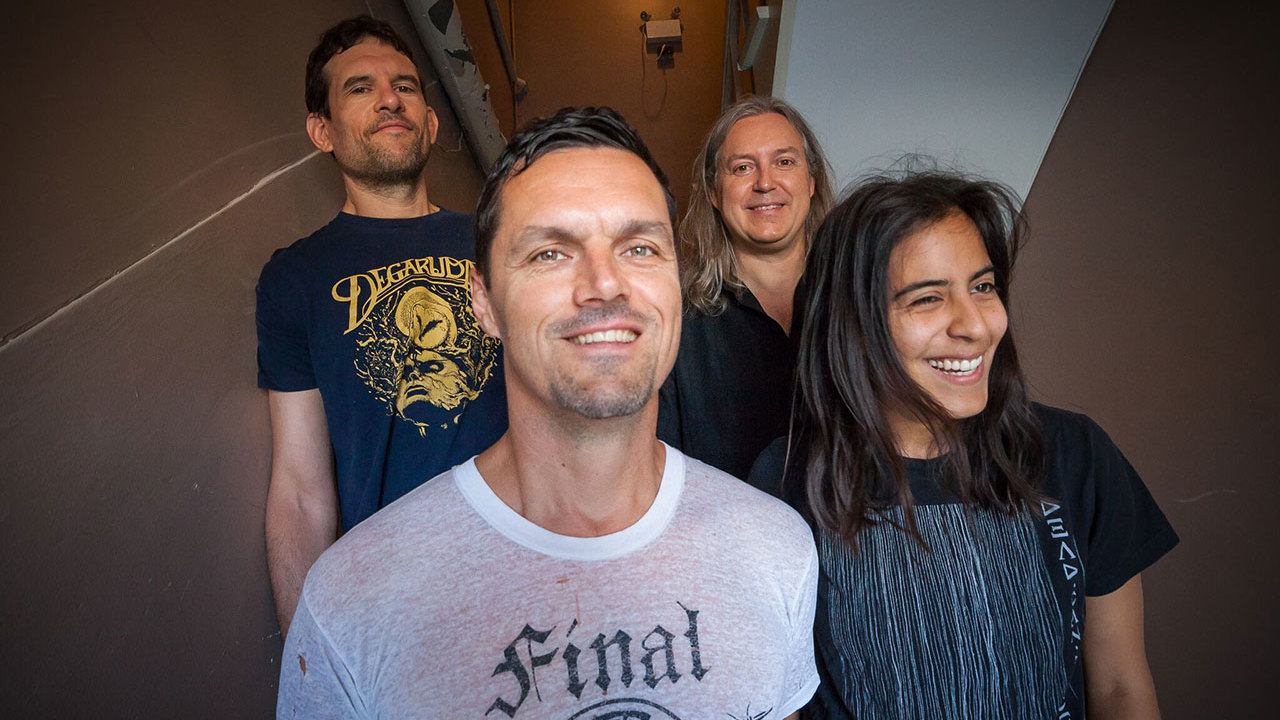Propagandhi: "The elephant in the room is civilization itself"
Talking to Propagandhi's Chris Hannah about new album Victory Lap the bleakness of planet Earth right now

On September 29, mainstay Canadian punks Propagandhi will release their seventh album Victory Lap. Since their formation in 1986, frontman Chris Hannah and drummer Jord Samolesky have been through a handful of line-up changes and become known the world over for their biting liberal soundtrack, tackling topics from human rights to capitalism.
“I guess essentially we just don’t know when to quit,” laughs Chris, when questioned on what led to their first full-length record in five years.
“In the years between the last record and this one, a lot of crazy shit has gone down personally and planetarily. The songs are the same as usual, we’re just trying to put our laments about the world into musical form for others to become depressed by.”
To discuss these laments and the world falling apart around Propagandhi, we called up Chris at his home in Winnipeg, Manitoba, Canada for a chat…
Victory Lap is a phrase often used to signal a final hurrah. Are you winding down as a band?
“At this age you truly never know. Jord (Samolesky, drummer) and I are almost 50, and you start to realise around the age of 43 that the stuff we’re doing is somewhat athletic. Any sign of physical deterioration starts to show up in the practice space, and you have to train for it more than you used to when you were a kid. There is some sort of parallel to pro-sports. If Jord blows out his knee or his elbow fuses together then we’re done. You never know.”
The opening track (Victory Lap) goes in all guns blazing and tackles many societal topics head on in the space of three minutes. How important is it to you to go in hard straight away?
Sign up below to get the latest from Metal Hammer, plus exclusive special offers, direct to your inbox!
“There was no conscious decision to do it. For most of the songs I wrote on this record I tried to go in with a different philosophy than I have in the past. Instead of labouring over every word and making everything perfectly fit some sort of end result, the rule was ‘First thing out of my mouth is the first thing that goes on the paper.’ I was unable to stick to that 100% of the time, but you’re the first person to point out that there’s different ideas crammed together, and that’s exactly what that song was. It’s three or four songs I was working on and I thought fuck this shit, I don’t have time for this, let’s jam it all together and see what happens.”
The end of that same song speaks of the rapture and suggests that we’re all fucked. Is that really how you see the world right now?
“It depends what time of the day you ask me and what day of the week it is. In general I would say that we’re headed for a societal collapse, and I’m not even sure that’s a bad thing in the long term. I have this strong intuition that the elephant in the room is civilization itself, and that leaves us in a really hard spot. If that is the case, we need some sort of collapse to get to something that isn’t so inherently problematic.
“On the other hand, I don’t want people to think it’s fine to do nothing on the way to the end. I draw a lot of inspiration from the Black Lives Matter movement or here in Canada specifically the indigenous resistance movement. I think a lot of what they’re doing is very inspiring; the endurance, patience and commitment to salvaging what’s left of a sane society is really inspiring to me. I try to focus on that stuff in my personal life so I don’t just end it all.”
Propagandhi were considered militant by their reputation. Do you consider yourself an an activist?
“No. I see the band now as more of a conduit for marginalised voices rather than considering the band an activist project. I think there are voices out there that aren’t getting heard that actually have things with more substance to say. I would rather signal boost voices from communities of colour and provide those perspectives to people who were denied those perspectives when they grew up. I don’t really consider myself an activist, I’m a middle-aged headbanger in a band.”
- Stray From The Path: Nazis, death and politics
- Prophets Of Rage: "We’re part of the resistance – sonic, cultural and political"
- Comeback Kid: Hardcore can change lives
- Read Classic Rock, Metal Hammer & Prog for free with TeamRock+
What instilled these morals and principles in you?
“In my teen years when I discovered bands like Millions Of Dead Cops and Dead Kennedys and Corrosion Of Conformity. The early-mid ‘80s punk and hardcore scene was intensely political and I encountered it at a time in my life when I had extremely conservative views, so it was very challenging for me to get through the ideas. I had a Millions Of Dead Cops record, but when I held up their version of reality to my version of reality, and looked at the real world, it became clear that the world I grew up with was absurd. We’ve tried to honour that inspiration as the band has aged.”
How did you get involved in punk in the first place?
“Back in the early ‘80s, I was a complete metalhead involved in the underground tape-trading scene. At school one day, Jord, our drummer, walked up to me and we started talking about music. He’d heard about punk music and I was not interested, but then he showed me the MDC record and I thought ‘Holy shit, this has all the elements that I like about Venom and Slayer, and something else that I can’t put my finger on’. The MDC record was what linked us to the hardcore scene at the time, and it became much more interesting because it wasn’t just the hyperactive music, you also had more to think about in terms of the lyrics. There was a big DIY ethic so it was a little more hands-on than the metal scene I grew up with.”
You’ve been doing this for nearly 30 years. Where do you see Propagandhi in 2017?
“Nobody in the music scene in Winnipeg gives a shit about a perceived status. Even amongst ourselves, we just go to the practice space to play songs and I don’t really think about Propagandhi outside of the practice space, we don’t think about it in terms of the industry. We’re so far removed from all the bands that are considered our peers, we still think of the band the same way we did when we were jamming in my mom’s basement in the early ‘90s.”
Are you happy existing on your own little island?
“I guess so. I think what maybe bothers us is if you go on iTunes and you look at a Propagandhi record, then you look at related bands, it’s like ‘Oh fuck, come on! Why is it always NOFX and Lagwagon! Come on! Put some cool bands in there!’ I’m not really sure how people perceive it, but we’re totally fine being isolated and alone and desolate and lonely.”
Where does Victory Lap sit amongst Propagandhi’s catalogue?
“If you don’t think your latest record is your strongest record then you should delete it and start again. All the core values are pretty much in tact from the first or second record until now. We’ve modified some perspectives, but we definitely haven’t abandoned the values. I’m more comfortable signal boosting the perspectives of people who have much more to gain and much more to lose in terms of social justice. A lot of people are tired of hearing another white man pontificate about things and I am too, I’m tired to hearing me. I’m just a guy in a fucking band and the band is gonna rock out.”
Victory Lap is out September 29 on Epitaph Records and is available to pre-order now.
Punks, Nazis, Skins, and The Clash's finest hour
The 10 best Epitaph albums, by Millencolin's Nikola Sarcevic
Luke Morton joined Metal Hammer as Online Editor in 2014, having previously worked as News Editor at popular (but now sadly defunct) alternative lifestyle magazine, Front. As well as helming the Metal Hammer website for the four years that followed, Luke also helped relaunch the Metal Hammer podcast in early 2018, producing, scripting and presenting the relaunched show during its early days. He also wrote regular features for the magazine, including a 2018 cover feature for his very favourite band in the world, Slipknot, discussing their turbulent 2008 album, All Hope Is Gone.
